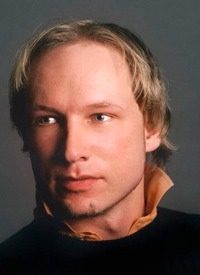
During his second police interrogation on July 29, Breivik originally said he would not discuss anything until Norwegian King Harald V, the ruling Labor Party-led government, and the nation’s top military leaders all stepped down. Apparently he wanted to be in charge. But all of his demands were denied outright.
But according to prosecutor Paal-Frederik Hjort Kraby, Breivik, who confessed to the July 22 twin terror attacks that left over 75 people dead, eventually became "very willing to talk" about most things during the 10-hour interrogation. However, the killer is still refusing to discuss the other “cells” he claimed to have been working with — unless and until his demands are met.
So far, authorities have said they believe Breivik acted alone. A broader conspiracy involving “Knights Templar” alluded to in the killer’s manifesto and interrogations, however, has not been completely ruled out.
Breivik’s lawyer, Geir Lippestad, told the Associated Press that the terrorist had two separate lists of demands. The first one is apparently considered normal for prisoners in Norway — cigarettes, regular clothes, and similar items.
The second list is filled with what Lippestad called “unrealistic” requests that are “far, far from the real world and show he doesn't know how society works." Those demands include the “complete overthrowing” of Norwegian and European societies, according to the attorney.
"They are completely impossible to fulfill," Lippestad told the AP. “It shows that he doesn't understand the situation he's in." The outrageous requests contributed to the lawyer’s early conclusion that Breivik is probably insane.
Another odd request Breivik made: An evaluation by a Japanese psychiatrist. The terrorist has apparently consented to an examination by Norwegian mental health evaluators, but he is insisting on a specialist from Japan as well.
“This wish has to do with the concept of honor,” Lippestad told a Norwegian newspaper. “He believes that a Japanese person will understand him better than someone from Europe."
Speculation about Breivik’s mental state has been rampant since the attacks, and the court already appointed two psychiatrists to make an assessment by November. But several experts have said they did not believe the killer would be able to escape prosecution by invoking an insanity defense.
"It is not very likely that he was psychotic," the chief of the Norwegian Board of Forensic Medicine, Dr Tarjei Rygnestad, was quoted as saying. He believes that the planning and execution of the attacks would be far too complex for somebody suffering from psychosis.
For now, Breivik is being held in solitary confinement at a maximum-security prison near Oslo. All of the court proceedings have been closed to the public, reportedly due to fears that the killer would use open hearings as a platform to spread his views.
If Breivik is found to be mentally competent, he could be sentenced to a maximum of 21 years in prison under a terrorism conviction. But prosecutors are also considering charging him with crimes against humanity — a charge that could result in up to 30 years behind bars.
Meanwhile, fallout from the terror attacks continues to build in Norway and around the world. At least some policy repercussions are considered almost inevitable, but what exactly might change remains unclear.
Governments around Europe are reportedly on high alert for “copy-cat” attacks, and some stores in Norway have started pulling violent video games from the shelves. Anti-Muslim political rhetoric in Europe has also been toned down since the attacks.
The Norwegian government set up a commission to investigate the tragedy. But for now, the Prime Minister has called for “more democracy,” even as analysts predict new “security measures” in the near future.
The “blame game” is also continuing to grow, with a great deal of media finger-pointing directed at anti-immigration activists and right-of-center political parties. Attacks on Freemasonry and Christianity are getting louder, too.
Based on a 1,500-page "manifesto" released by the killer, it appears that he viewed himself as a modern-day “crusader” working to expel Muslims from Europe. His attack, directed at the Norwegian Labor Party and its youth wing, was apparently aimed at those he viewed as “traitors.”
In addition to admitting that he was not a Christian in the true sense, Breivik suggested that the movement he saw himself as being part of should work with Islamic terror groups such as al-Qaeda. He also thought “science,” not biblical teachings, should reign supreme in Europe.
Breivik confessed to the attacks early on, but he is still denying criminal responsibility by claiming the murders were “necessary.” But as tough questions continue to mount, more information about the killer, the police response, and the trial is expected in the coming days.
Photo of Anders Behring Breivik: AP Images



